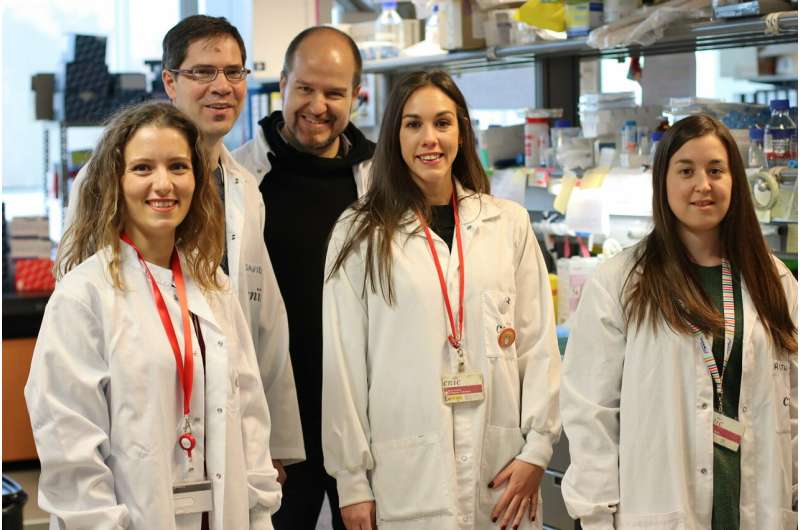Scientists identify a new 'watchdog' that controls intestinal bacteria

The immune response to our intestinal microbiota, the community of microorganisms that live in the human gut, ensures that these microorganisms remain in their proper place. When the intestinal immune barrier is damaged, the gut bacteria can spread and cause inflammation throughout the body. Now, a study by researchers at the Centro Nacional de Investigaciones Cardiovasculares (CNIC) and the Department of Immunology at the Universidad Complutense in Madrid reveals a new mechanism in the regulation of this immune barrier.
The study, published in the journal Immunity, identifies a mechanism through which intestinal bacteria such as Lactobacillus strengthen the intestinal barrier to support a mutually beneficial relationship and prevent inflammation. The results have potential implications for the treatment of diseases featuring the spread of commensal bacteria outside the gut, as occurs, for example, in some metabolic disorders.
The study was directed by David Sancho, who heads the Immunobiology lab at the CNIC. He explained that the study shows that "these intestinal bacteria contain or secrete molecules that bind specifically to the receptor Mincle (Clec4e). Mincle is expressed on the surface of antigen presenting cells of the innate immune system known as dendritic cells, and its function is to strengthen the intestinal barrier."
The intestinal barrier restricts the localization of commensal microorganisms so that they stay in the intestine. This barrier can be weakened by some diseases and specific factors such as diet, leading to the systemic inflammation associated with autoimmune and metabolic diseases.
The research team has proposed that a new treatment strategy for these conditions could be the use of probiotics (intestinal microorganisms with beneficial properties) or prebiotics (nutrients that promote the growth of beneficial microorganisms); however, the mechanisms underlying this strategy are for the present unknown.
Molecular mechanisms
Little is known about the molecular mechanisms through which commensal gut bacteria contribute to the maintenance of the intestinal barrier that keeps them in the environment where they are beneficial. Sancho says, "Our study demonstrates that the interaction of commensal bacteria with the receptor Mincle contributes to an immune response that serves to maintain these bacteria in the gut. This interaction prevents the spread of these bacteria to the liver and other organs where they could trigger inflammatory and metabolic disorders."
In animals lacking Mincle, "we observed an increase in the number of bacteria able to escape from the intestine and reach the liver, where they caused inflammation and metabolic changes." These findings highlight the potential of Mincle as a target for future therapies aimed at strengthening the intestinal barrier in situations when it is damaged or weakened.
The study shows that mice lacking Mincle had reduced numbers of intestinal lymphocytes producing cytokines IL-17 and IL-22. Study co-director Salvador Iborra explained, "In the presence of Mincle, the commensal bacteria promote this immunological response, strengthening the intestinal barrier and thus preventing systemic inflammation."
The research team also observed that the intestinal barrier in mice was strengthened by treating them with commensal microorganisms such as Lactobacillus during early postnatal development. This effect was achieved through the interaction of these bacteria with Mincle expressed on dendritic cells in the intestine. First author María Martínez-López said, "The identification of new molecular communication pathways between the host immune system and commensal microorganisms is vital for the development of treatments for situations where the mutually beneficial relationship is disturbed."
More information: María Martínez-López et al, Microbiota Sensing by Mincle-Syk Axis in Dendritic Cells Regulates Interleukin-17 and -22 Production and Promotes Intestinal Barrier Integrity, Immunity (2019). DOI: 10.1016/j.immuni.2018.12.020


















